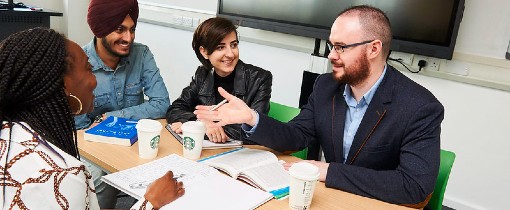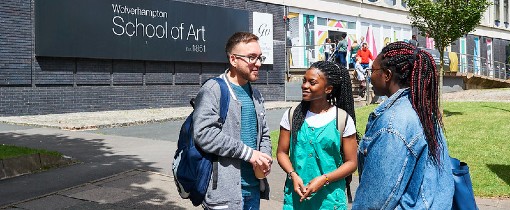
Our priority is the success of all those who wish to study with us, focusing on ensuring greater inclusivity and ensuring equity of outcome. This commitment will ensure that we focus on who is participating and how they achieve. We are committed to removing barriers to ensure that all can participate and achieve their potential.
On this webpage, you'll find information, case studies and news stories about how we are bringing the Vision 2030 Students and Education sub-strategy to life.
Our foundations for inclusive student success
Our priority is the success of all those who wish to study with us, focusing on ensuring greater inclusivity and ensuring equity of outcome.
Inclusivity underpins Vision 2030. The University of Wolverhampton attracts a highly diverse student population who bring with them their identities and interests from their own communities (local, regional, national and international). Many are the first in their family to attend higher education and have to fit study into busy and complex lives, coming to university as mature students. We recognise our responsibility to adopt respectful behaviours, demonstrate that we care, and build an inclusive culture so that all of our students can succeed in meeting their full potential. The design and delivery of our courses must be informed by students’ lived experiences and interests, thereby nurturing their sense of belonging.
Wellbeing may be understood as a form of social capital that is embodied and is accumulated through an individual's life journey, which means that inclusivity and wellbeing are mutually reinforcing. Disabled students have to overcome barriers that do not challenge others, and our students' testimonies have exposed how many feel that they are othered by our structures and culture. An inclusive curriculum will nurture our students' wellbeing by minimizing barriers and by helping to secure their sense of belonging as a member of the University community. However, we need to go further and design wellbeing to enable all of our students to achieve their full potential.
We believe that universities are about transforming society by ensuring the needs of their Place and people are at the heart of what they do. We aim to support our region's economic, social, cultural and inclusive growth by providing skills-based and employer-led higher education. We encourage our students to give back to their communities, supporting their volunteering and developing an ethos of citizenship through curricula and co-curricular activities.
The diversity of our student population and the complexity of their lives require us to take a student-centred approach. Learning and assessment need to be delivered at a pace, in formats and through media that meet the needs of individual students. Both academic and pastoral student support needs to be built around the specific needs of each student, recognising the differences in life histories and journeys into higher education.
All our courses should offer students the opportunities to develop knowledge, attitudes, skills and habits which underpin six graduate attributes:
- Inclusivity: Reflexive practitioners with a commitment to inclusivity, equity and diversity.
- Wellbeing: Aware of their own wellbeing and that of others.
- Sustainability: Demonstrate individual responsibility for sustainability and understand the importance of sustainability.
- Digital: Confident and critical users of digital technologies.
- Community: Make positive contributions to the economic, social and cultural life of their communities.
- Global: Apply their learning through a global lens in the places they live and work.
The Inclusive Curriculum Framework positions students and staff as co-creators of our students' educational journeys. The student voice (our students' thoughts, views, and opinions) needs to be heard and listened to shape the student experience at the University of Wolverhampton. We are committed to working in partnership with the Students' Union to ensure that all students have a fulfilling experience, develop a strong sense of belonging, and are empowered to overcome any barriers they might face during their studies.
Practice-Based Learning (PBL) has always been a key aspect of the University of Wolverhampton's pedagogical approach. Through applying their learning in real-life or simulations, students secure, reinforce and extend their understanding and develop their skills, attributes and confidence. Methods and applications will differ across disciplines, but it is essential to understand that PBL is not limited to those courses which prepare students for a specified profession. Moreover, since society's grand challenges require interdisciplinary solutions, practice-based education will be richer when it draws together students from different subject areas.


/prod01/wlvacuk/media/departments/digital-content-and-communications/images-2024/240328-Varsity-Line-Up-Resized.jpg)
/prod01/wlvacuk/media/departments/digital-content-and-communications/images-18-19/220325-Engineers_teach_thumbail.jpg)
/prod01/wlvacuk/media/departments/digital-content-and-communications/images-2024/240404-Digital-Humanities-Training-Resized.jpg)
/prod01/wlvacuk/media/departments/digital-content-and-communications/images-2024/240320-Uzbekistan-Resized.jpg)
/prod01/wlvacuk/media/departments/digital-content-and-communications/images-2024/240229-The-Link-Resized.jpg)
/prod01/wlvacuk/media/departments/digital-content-and-communications/images-2024/240404-Pharmacy-Students-Resized.jpg)


/prod01/wlvacuk/media/departments/digital-content-and-communications/images-18-19/220715-Graduation-Window-Resized.jpg)
/prod01/wlvacuk/media/departments/digital-content-and-communications/images-18-19/220701-Chamber-Photography-Resized.jpg)
/prod01/wlvacuk/media/departments/digital-content-and-communications/images-18-19/220701-Wolves-ESport-Indian-Competition-Resized.jpg)
/prod01/wlvacuk/media/departments/digital-content-and-communications/images-18-19/Lucy_teaser.jpg)
/prod01/wlvacuk/media/departments/digital-content-and-communications/images-18-19/220629-Lord-Paul-Winners-Resized.jpg)
/prod01/wlvacuk/media/departments/digital-content-and-communications/images-18-19/220307-Springfield-Rear-Shot.jpg)
/prod01/wlvacuk/media/departments/digital-content-and-communications/images-18-19/220615-Spot-Resized.jpg)
/prod01/wlvacuk/media/departments/digital-content-and-communications/images-18-19/220613-sports_leadership_resized.jpg)
/prod01/wlvacuk/media/departments/digital-content-and-communications/images-18-19/220610-Adam-Howells-Resized.jpg)
/prod01/wlvacuk/media/departments/digital-content-and-communications/images-18-19/220607-Esports-Team-Resized.jpg)
/prod01/wlvacuk/media/departments/digital-content-and-communications/images-18-19/Sport_Awards_teaser.jpg)
/prod01/wlvacuk/media/departments/digital-content-and-communications/images-18-19/Walsall_golf_club_teaser.jpg)
/prod01/wlvacuk/media/departments/digital-content-and-communications/images-18-19/brandon_teaser.jpg)
/prod01/wlvacuk/media/departments/digital-content-and-communications/images-18-19/220405-Times-Student-Nurses-Resized.jpg)
/prod01/wlvacuk/media/departments/digital-content-and-communications/images-18-19/220401-BAS9-Student-Volunteers-Resized.jpg)
/prod01/wlvacuk/media/departments/digital-content-and-communications/images-18-19/220328-Badge-Ceremony-Resized.jpg)
/prod01/wlvacuk/media/departments/digital-content-and-communications/images-18-19/Football_coaching_teaser.jpg)
/prod01/wlvacuk/media/departments/digital-content-and-communications/images-18-19/220317-Sport-and-Performing-Arts-Resized.jpg)
/prod01/wlvacuk/media/departments/digital-content-and-communications/images-18-19/220316-CIM-Students-Resized.jpg)
/prod01/wlvacuk/media/departments/digital-content-and-communications/images-18-19/Nursing_students_119.jpg)


.jpg)

.jpg)
.jpg)
.jpg)


